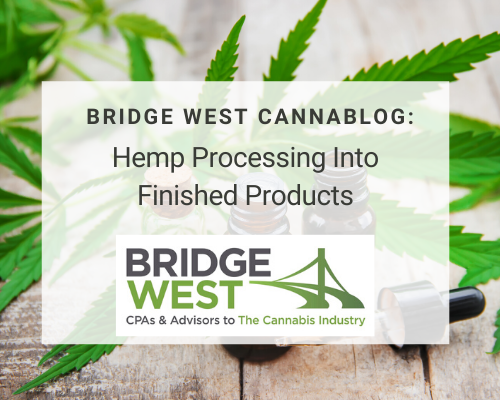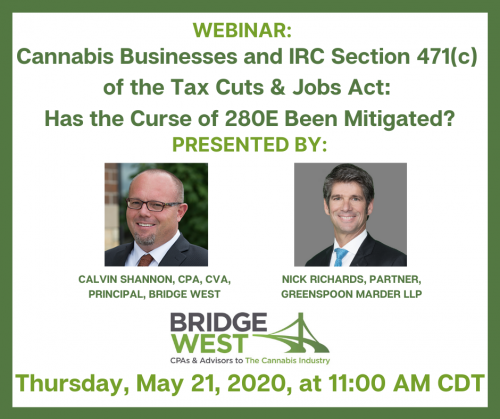Cannablog by Bridge West: Hemp Processing into Finished Products
The process of turning extracted biomass into CBD oil is not only complicated technically, but it is incredibly costly. Many hemp farmers in Colorado are still figuring out what to do with their biomass from last year. Even worse, storing biomass alone is a massive business expense. Jim Marty, CEO, and Founder of MGI North America member-firm Bridge West, shares insight on the current challenges farmers and extraction companies are facing in his recent blog, “Hemp Processing into Finished Products.“
Cannablog by Bridge West: Hemp Processing Into Finished Products
There is an old saying in the accounting world that goes, “If you don’t know what your costs are, you will pretty soon.” That is what is going on with the biomass from the 2019 hemp harvest. Many hemp farmers in Colorado are still trying to sell their biomass seven months later. Up to now, the bottleneck, has been the lack of extraction processing. Within the last month, we have seen large extraction machines come on-line. The questions currently being debated between those extraction companies and hemp farmers are:
- Who pays for the extraction process? and
- Are there buyers for the extracted CBD oil?
Hemp farmers have significant costs from 2019 that they have not yet recovered. For example, a crop of 100,000 pounds of biomass can have carry over business expenses of $600,000 or more for planting, labor, farm machinery, storage costs, and constant drying and turning, to prevent mold. Stored biomass is in a very unstable state since it can develop moisture and get moldy. If that happens, the entire crop is useless and needs to be thrown away. Converting the biomass to CBD oil prevents this from happening because CBD oil is very stable and can be stored indefinitely without fear of contamination.
However, the cost to process that 100,000 pounds into CBD oil can be another million dollars or more. Farmers are not able to come up with this kind of money. They are looking at the cost of planting their 2020 hemp fields and debating if they should plant at all. In response, the new extraction companies are offering to defer part of the processing cost until the oil is sold. Still, they are asking for half of the processing fee up front. Another $500,000 for processing on top of their $600,000 of 2019 costs and the deferred processing fee of $500,000 puts the total cost to the farmer at $1,600,000. What can it be sold for? In the CBD oil business, this is called “the offtake.”
With processing losses and the reduction of biomass to oil, 100,000 lbs. can yield about 1,800 kilos of CBD distillate. The average March 2020 selling price for a kilo of distillate was $1,500. Thus, 1,800 kilos of distillate are worth $2.7 million, so it is still possible to turn a profit from the 2019 crop. The next question is how likely is the offtake?
Finished good processors have an abundance of CBD isolate and distillate from which to choose. Prices vary greatly depending on the quality of the products. Farmers and extraction companies are still facing considerable expenses and risks to turn their biomass into a profit.
Stay tuned for more CannaBlogs from Bridge West CPAs and Advisors to the Cannabis Industry. Contact Jim Marty, CEO of Bridge West, at 303-651-0304 and jmarty@bridgewestcpas.com with any questions related to hemp processing. Bridge West has solely focused on the cannabis and hemp industries for more than ten years and to learn more about our wide range of accounting, tax, and advisory services, please visit: www.bridgewestcpas.com.











